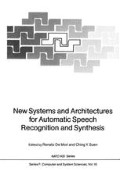Abstract
In this study, a computationally efficient speaker independent isolated word recognition system for Turkish language is designed and implemented. The approach used is a combination of whole-word matching techniques with segmentation into phonetic units before classification. Linear Predictive Coding (LPC) coefficients for an eight-pole model of the short-time signal are used as feature vectors. Computational costs are reduced by a two-step classification strategy where unlikely words are eliminated in the first step by comparing only the first syllable. The Dynamic Time Warping (DTW) method is used in comparisons at both levels.
CPU time spent for word comparisons is reduced by about 40% compared to the time that has to be spent for a one-step whole-word classification without degrading the system performance.
Access this chapter
Tax calculation will be finalised at checkout
Purchases are for personal use only
Preview
Unable to display preview. Download preview PDF.
References
Makhoul,J., ’Linear Prediction: A Tutorial Review’, Proc. IEEE, 63, 1975, pp.583–587
Ünal,F., ‘A Speaker Independent Isolated Turkish Word Recognition System’, M.S. Thesis, METU, Ankara, Turkey, 1983.
Rabiner,L.R., Schafer,R.W., ‘Digital Processing of Speech Signals’, Prentice-Hall, 1978.
Itakura,F., ‘Minimum Prediction Residual Principle Applied to Speech Recognition’, IEEE Trans. Acoust. Speech and Signal Processing, Vol. ASSP-23, 1975, pp. 67–72
Sakoe,H., Chiba,S., ‘Dynamic Programming Algorithm Optimization for Spoken Word Recognition’, IEEE Trans, on Acoust. Speech and Signal Processing, Vol.ASSP-26, 1978, pp. 43–49.
Rabiner,L.R., Wilpon,J.G., ‘Considerations in Applying Clustering Techniques to Speaker Independent Word Recognition’, J. Acoust. Soc. Am. 1979, pp. 663–673
Töreci,E., ‘Statistical Investigations on the Turkish Language Using Digital Computers’, M.S. Thesis, METU, Ankara, Turkey, 19 74
Özmen,H., ‘A Microcomputer Based System for the Recognition of Spoken Turkish Digits’, M.S. Thesis, METU, Ankara, Turkey, 1981.
Author information
Authors and Affiliations
Editor information
Editors and Affiliations
Rights and permissions
Copyright information
© 1985 Springer-Verlag Berlin Heidelberg
About this paper
Cite this paper
Yalabik, N., Ünal, F. (1985). An Efficient Algorithm for Recognizing Isolated Turkish Words. In: De Mori, R., Suen, C.Y. (eds) New Systems and Architectures for Automatic Speech Recognition and Synthesis. NATO ASI Series, vol 16. Springer, Berlin, Heidelberg. https://doi.org/10.1007/978-3-642-82447-0_16
Download citation
DOI: https://doi.org/10.1007/978-3-642-82447-0_16
Publisher Name: Springer, Berlin, Heidelberg
Print ISBN: 978-3-642-82449-4
Online ISBN: 978-3-642-82447-0
eBook Packages: Springer Book Archive

